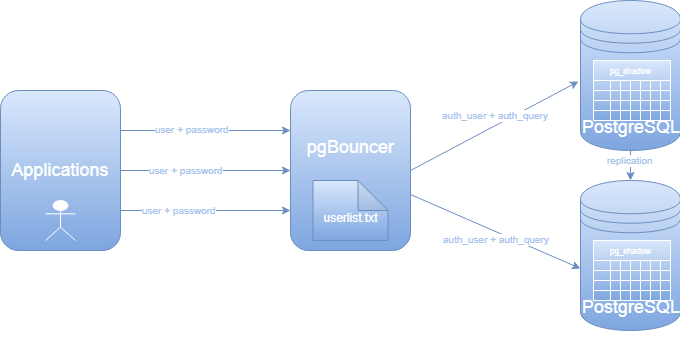

In an implementation without pgbouncer the size of an initialized database should be a little over 100MB. I have checked the schema and I only have public schema. In further inspection I checked the database size using psql \l+ it showed only 8MB.Īnd when I tried to display all tables inside the database using psql \dt it says pgbouncer is a lightweight connection pooler for PostgreSQL Learn more Top users Synonyms 292 questions Newest Active Filter 0 votes 1 answer 37 views I cannot connect to PgBouncer remotely I have postgresql installed on vultr 'Ubuntu 20.04'. But when I tried to create a new database using the same name with the previous database, I got all the previous tables without even having to initialize.Īnd I got all the previous data inside the tables too.

The database was deleted, I can no longer see it in psql \l. I read about using PgPooI-Il, using PgBouncer, using various replication mechanisms and so on. CockroachDB is a cloud-native SQL database for building global, scalable cloud services that survive disasters. I was looking for a PostgreSQL resilient cluster solution. It adds two new significant features: Routing: Intelligently send queries to different database servers from one client connection use it to partition or load balance across multiple servers or clusters. Things start getting weird when I tried to delete the database. PGBouncer is a lightweight connection pooler for PostgreSQL. The pgbouncer-rr project is based on pgbouncer, an open source, PostgreSQL connection pooler. When I created a database and initialized the database (created all the necessary tables for the application) everything works as intended. # | Database configurations that setup Odoo to connect to aĪddons_path = /opt/odoo/sources/odoo/addons,/mnt/logic-addons,/mnt/data-addons # | Define the application port and longpolling ports. Here is my nf application configuration file # -*- coding: ascii -*. Here is my pgbouncer.env DATABASES_HOST=dev8_db POSTGRES_DB=postgres # Leave this set to postgres $ docker exec -it myclient psql -h 172.17.0.I tried implementing pgbouncer and found unusual behavior that I cannot solve. $ docker exec -it mybouncer sed -i "s/0.0.0/0.0.3/" /etc/pgbouncer/bouncer_hba.conf Many Git commands accept both tag and branch names, so creating this branch may cause unexpected behavior. $ docker exec -it mybouncer sed -i "s/17.0.0/0.0.0/" /etc/pgbouncer/bouncer_hba.conf docker - postgresql with pgbouncer tables not showing - Stack Overflow postgresql with pgbouncer tables not showing 0 I tried implementing pgbouncer and found unusual behavior that I cannot solve. A tag already exists with the provided branch name. $ docker exec -it mybouncer sed -i "s/16/8/" /etc/pgbouncer/bouncer_hba.conf $ docker exec -it mybouncer service pgbouncer restart $ docker exec -it mybouncer sed -i "s/0.4/0.0/" /etc/pgbouncer/bouncer_hba.conf
$ docker exec -it myclient psql -h 172.17.0.4 -p6432 -c "select 1" prodb enterprisedb To: pgsql-adminxxxxxxxxxxxxxxxxxxxx Subject: Pgbouncer, docker and systemd From: Kristjan Mustkivi$ docker exec -it mybouncer cat /etc/pgbouncer/bouncer_hba.conf PgBouncer Docker image This is a minimal PgBouncer image, based on Alpine Linux. Now, if you want to use the server's IP address, the CIDR parsing behaves a bit unexpectedly in order for bouncer_hba.conf to work as expected, the CIDR notation requires zeros for the masked/irrelevant portions (note that myclient has IP address 172.17.0.5, but as you'll see, it's not really relevant in the examples I show below): $ docker exec -it mydb cat /var/lib/edb/as9.6/data/pg_hba.conf Psql: ERROR: login pgbouncer]# psql -h 172.17.0.4 -p6432 -c "select 1" prodb enterprisedb But if you use the server's IP address (and not the loopback address), it'll work: pgbouncer]# cat bouncer_hba.conf 147 subscribers in the DevOpsJob community. For example, using 127.0.0.1 won't work unless the HBA file is set to 0.0.0.0/0. However, there are a few gotchas that make it a little tricky for new users, and I hope that clarify one of those with this post. Since then, several improvements have been implemented, including the ability to use auth_type=hba, which implements a PG-like HBA authentication method similar to the pg_hba.conf format we're all used to. I've been using it for many years, since it first became available in 2007. PgBouncer is a great tool for improving database performance with connection pooling.


 0 kommentar(er)
0 kommentar(er)
